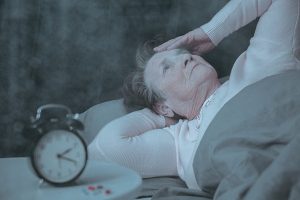
Learn signs to watch for that could indicate medical attention may be needed for a senior related sleep disorder.
Common senior sleep disorders often cause negative effects such as extreme fatigue, problems with concentration and memory, and sleepiness. Making sure that senior loved ones experience a good night’s sleep can help ensure family caregivers do too. Below we’ve described the most prevalent disorders that can interrupt sleep and include signs to watch for that indicate medical attention may be needed:
Restless Leg Syndrome (RLS):
- RLS is a neurological movement disorder expressed by the overpowering urge to move the limbs during times of rest and relaxation. A person may also have a creeping, pulling, or tingling sensation in the legs, often becoming more intense in the evening hours, making it burdensome to fall asleep or stay asleep.
- When to see help: If RLS is interrupting sleep, contact the physician.
Obstructive Sleep Apnea (OSA):
- OSA causes breathing to repeatedly stop and start during sleep. This occurs when your throat muscles intermittently relax and block your airway during sleep. A noticeable sign of obstructive sleep apnea is snoring. Sleep apnea can cause disjointed sleep patterns and low blood oxygen levels, sometimes leading to mood and memory problems, hypertension and even heart disease.
- When to seek help: Persistent snoring that can be heard from across the room, gasping for air, or breathing starts and stops during sleep are all issues that should be addressed by a senior’s medical team.
Chronic Obstructive Pulmonary Disease (COPD):
- COPD makes it difficult to empty air out of the lungs. This difficulty in airflow obstruction can lead to shortness of breath or feeling tired because the senior is working harder to breathe. COPD is a term that is used to include chronic bronchitis, emphysema, or a combination of both conditions. People with COPD often experience chronic coughing, have trouble breathing, tightness in the chest and fatigue.
- When to seek help: Contact a physician if a senior is regularly coughing every morning, having difficulty breathing, or is wheezing. Other signs to have evaluated include a long-term sputum-producing cough, frequent nighttime urination, insomnia, weight loss, or daytime sleepiness.
If you are caring for someone who has trouble sleeping at night, call the Van Buren County, IA home care experts from Advanced Home Health Care at 800.791.7785. We are happy to help you and your senior loved one better cope with common senior sleep disorders, get the rest required for better health, or assist with many other home care needs.

